AUCTORES
Globalize your Research
Review Article
*Corresponding Author: Chrisostomos Sofoudis MD, Ippokratous 209, 11472, Athens, Greece.
Citation: Chrisostomos Sofoudis. (2022). Sentinel Node in Endometrial Cancer. Metastatic Pathways. Journal of Clinical Surgery and Research, 3(5); DOI:10.31579/2768-2757/056
Copyright: © 2022 Chrisostomos Sofoudis. This is an open access article distributed under the Creative Commons Attribution License, which permits unrestricted use, distribution, and reproduction in any medium, provided the original work is properly cited.
Received: 15 July 2022 | Accepted: 29 August 2022 | Published: 04 August 2022
Keywords: sentinel node; endometrial cancer; staging; grading
Endometrial cancer represents the second most frequent malignant entity among gynecologic malignancies.
Many predisposition factors reflect and affect the chronical outcome of the lesion.
Age of the patient, obesity, postmenopausal vaginal bleeding among with endometrial hyperplasia, histologic type, grading, staging, vascular or lymph node penetration consist factors with direct depiction concerning the therapeutic mapping.
Sentinel node consists the first regional lymph node infiltration, indicating local or external spread of the lesion.
In order to explore and investigate potential infiltration or metastatic capability of the lesion, sentinel mode infiltration represents optimal solution.
According to current literature, sentinel node infiltration depicts increased sensitivity and specificity concerning surgical or conservative therapeutic management.
Aim of our study represents assiduous decoding of sentinel node infiltration and potential metastatic pathways, with ultimate scope the increased optimal survival and quality of life of the patient.
According to current literature, endometrial cancer consists the 2nd most common gynecologic malignancy in developed countries. [1] Focusing on imaging depiction and assiduous reflection of all predisposition factors, most of cases are nearly diagnosed. [2] Endometrial cancer classification remains the most diagnostic tool regarding the therapeutic mapping of such cases. (Table I.)
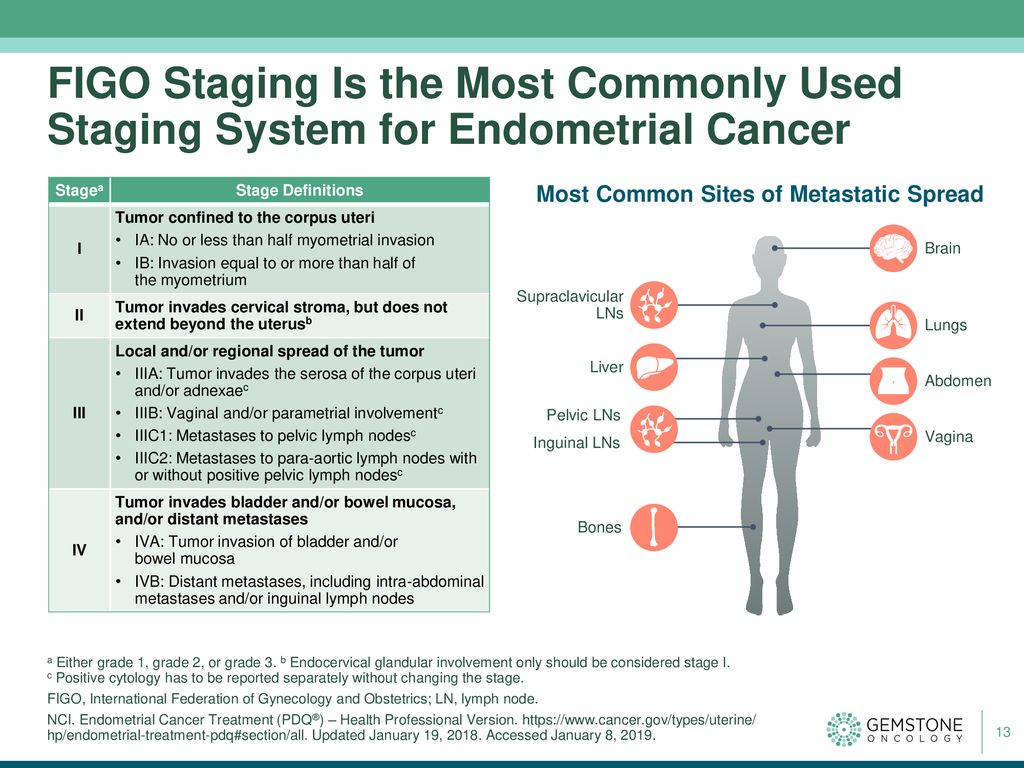
Among age of the patient, staging, grading, postmenopausal bleeding, histologic type, lymph node infiltration presents as most significant prognostic factor. [3]
Optimal treatment of endometrial cancer consists total abdominal hysterectomy accompanied with bilateral salpigo oophorectomy. Further surgical intervention is strongly adjusted with the lymphatic infiltration and the staging of the lesion. In cases of more than 50 % of myometrial invasion, bilateral lymphadenectomy should be performed. [3] Many conducted studies have proposed in cases of advanced stages, series of chemotherapy with radiotherapy, combined with hormonal therapy when estrogen and progesterone receptors were found positive. [4] Sentinel node consists as primary lymphatic external spread of each malignant entity. [5] Many recent studies have been conducted mostly in areas such breast malignancies or melanomas with great successful therapeutic management. Cutaneous melanomas presented as primary malignancies in which SLN mapping depicted worldwide acceptance. In cases of vulvar cancer SLN mapping managed to bring promising results in order to establish more precise therapeutic strategy.
Radio colloid and blue dye SLN mapping were first described in the early 1990s.
Lymphoscintigraphy in the early 1980s was initially used for SLN mapping in breast malignancies. Since 1977, SLN mapping procedures have been included in the treatment for a number of types of tumor, including vulvar, breast, anal, colon, skin, gastric, penile, esophageal, bladder, prostatic neoplasm and non-small cell lung cancer.
According to current bibliography, SLN mapping was depicted with Technetium Radio colloid (99Tc) alone or with blue dyes. Besides the daily use of these substances, many side effects were described. [6]
In many cases, skin and urine discoloration or allergic reactions were presented. Indocyanine green (ICG) consists an intravascular fluorescent dye, optimal tool concerning the visualization of retinal and choroid vascularization. [6]
Discussion
Many recent conducted studies, establish ICG as screening tracer regarding the SLN (Sentinel Node) mapping in endometrial cancer. Indocyanine green (ICG) consists a tricarbocyanine dye which can lead to emission of a fluorescent signal in the infrared light range capable of detecting the first lymphatic drainage concerning cases of endometrial cancer. Fluorescence‑guided imaging with ICG has a number of advantages, compared with conventional methods, including real-time lymphography, a low incidence of adverse reactions and an increased sensitivity, without requiring radiation.
Isolation and detection of SLN biopsy enables complete mapping of potential lymphatic infiltration. [7] Besides the low rate of lymphatic invasion in early stages of endometrial malignancies, complete lymphadenectomy represents ultimate scope of precise endometrial cancer staging. [7] (Figure I.)
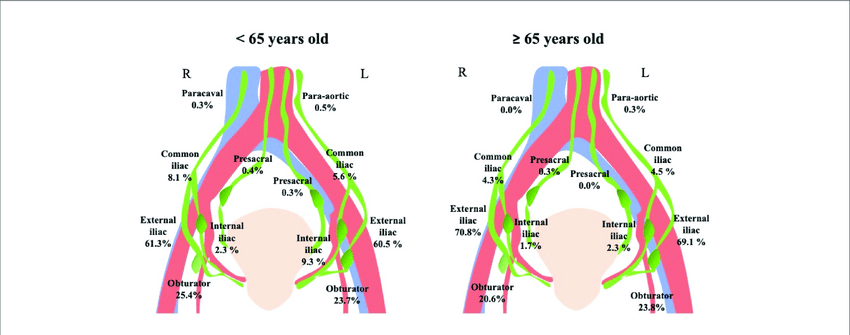
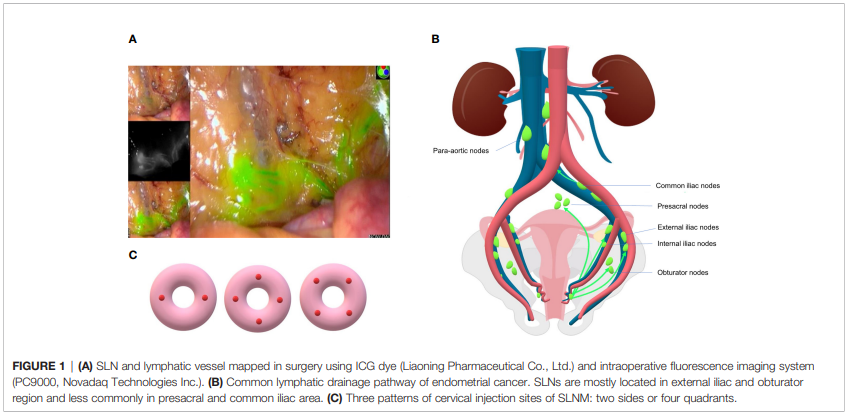
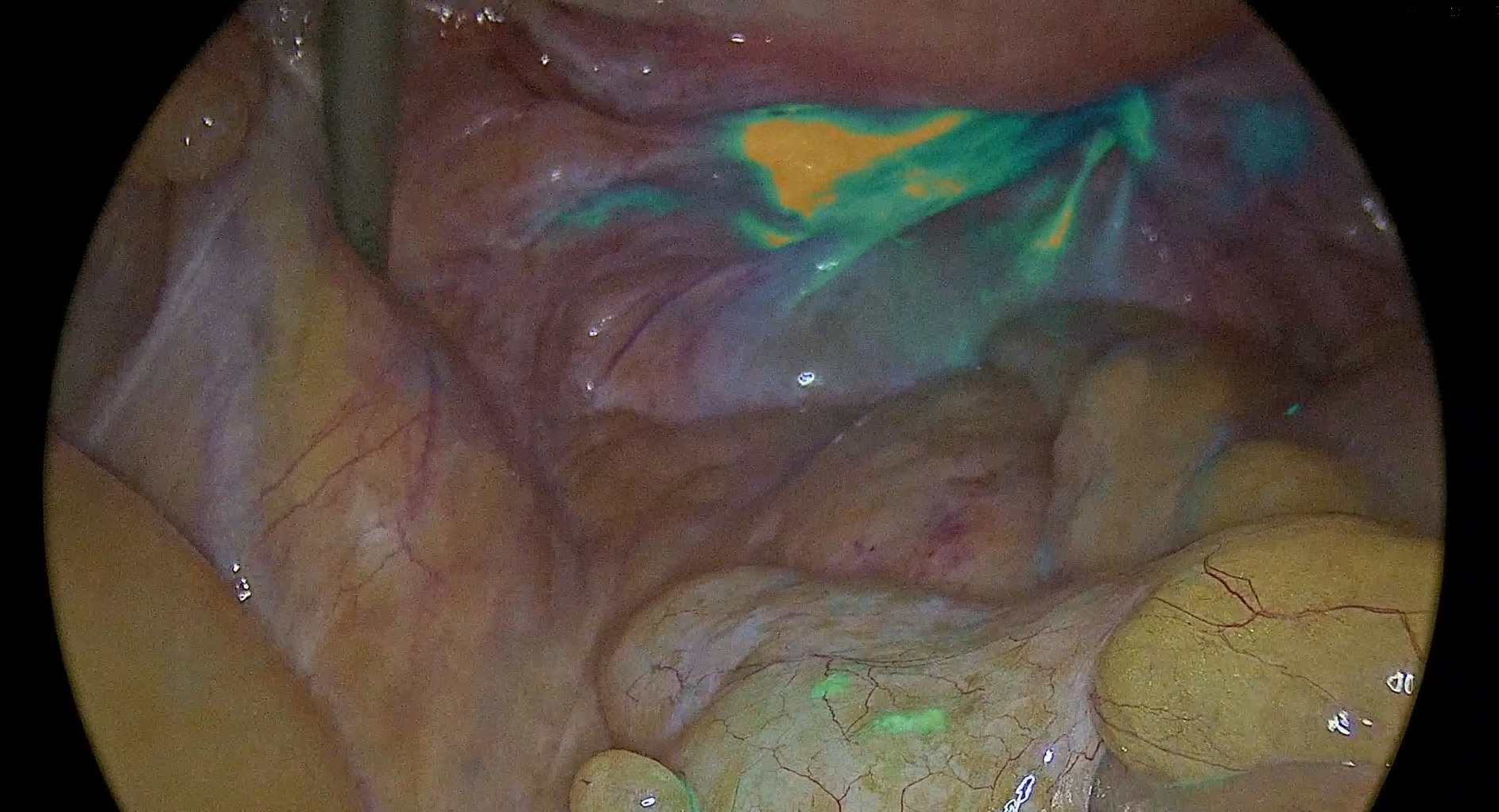
Lymph node staging and lymph vascular invasion and infiltration consist without doubt ultimate prognostic factors. [8]
Myometrial infiltration is strongly accompanied with nodal metastasis. Recent literature depicts nodal metastasis less than 3% in cases with less than 50% myometrium infiltration. [9]
Due to anatomic area of the uterus (midline structure), lymphatic spread divides into bilateral pelvic lymph nodes. On the other side, depiction of one at least SLN in every hemi pelvis area, underlies the significance of SLN mapping. Many conducted studies raised from current literature, perform different ways of injecting ICG. Optimal decoding of these manuscripts underlies the significance of the pathophysiologic mechanism.
The injection is diffused around 3rd and 9th para cervical hour, before setting and beginning of the laparoscopic exploration. (0,5-1ml superficial/1-3mm) and (0,5-1ml in depth/1-2cm) (Figure III.) [10]

An alternative injection method represents the four clock positions. In many cases the injections were placed intracervical at 2,4,8,10 o’clock positions. (Figure IV.) [10]
Only obstacle presented by cervical method depicts the decreased para-aortic detection rate in comparison with the endometrial method via hysteroscopy. [11]
Pathophysiologic mechanism of this method reflects the avoidance of ICG into the cervical arteries which can lead to diffusion of the dye into the systematic circulation causing many operative complications. [12]
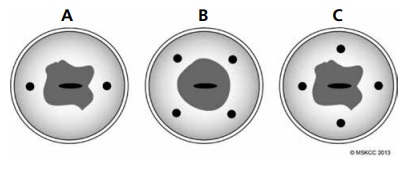
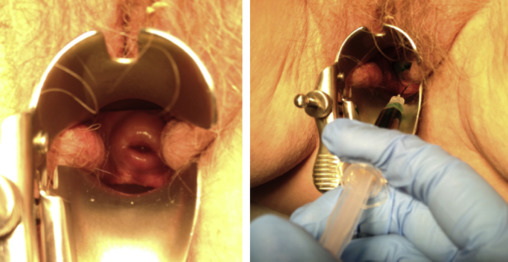
ICG injection is strongly accompanied with patient’s body mass index. In almost 20 min. complete lymphatic spread is being depicted.
Sentinel node consists the first lymph node infiltration concerning the lymphatic spread. Staging of the lesion is strongly accompanied with number and lymphatic penetration depth. [13]
Positive lymphatic spread of SLN consists with appearance of macro metastasis (tumor spread > 2mm), micro metastasis (tumor spread 0,2-2mm) and isolated tumor cells (tumor spread< 0>
Classical surgical therapeutic mapping in cases of endometrial cancer consists total hysterectomy, bilateral salpigoopherectomy and complete pelvic lymphadenectomy due to staging of the lesion. [15]
Less radical mapping reflects in low risk cases (FIGO IA, grade 1-2).
Decoding current bibliography, lymph vascular dissection seems to be controversial. [16]
In cases of complete and assiduous bilateral lymphadenectomy, many potential operative and post-operative surgical complications can be performed. [17]
Lymphedema local or diffuse accompanied with abdominal pain, skin breakdown and severe increased patient’s quality of life consist examples of postoperative complications.
Extended surgical intervention, nerve injury and potential blood loss in cases of complete lymphadenectomy, accelerate the entrance of SLN evaluation.
Focusing on SLN mapping as ultimate recurrence factor, depiction of lymph vascular infiltration, leads to postoperative strategy, such as adjuvant therapy.
Although in most of cases preferred SLN technique consists 99m Tc and preoperative lymphoscintigraphy, SLN detection with ICG reflects new diagnostic pathways. [18]
Many conducted studies suggest SLN mapping with ICG incidence of overall detection from 84% and 100% and more specific increased bilateral detection rate from 71% and 84%, without doubt higher than 58% and 75% of the classical technique (99m Tc and blue dye). [19]
SLN mapping with ICG allows more increased drainage of the contrast substance and depicts visualization of the whole pelvic lymphatic route in real time.
IGC technique consists an easily medical intervention, independent from patient’s BMI without adequate surgeon’s experience.
SLN detection procedure is based on the SLN protocol of Memorial Sloan-Kettering Center with H& E stain and CKAE1/AE3 immunostaining (Table I.) [20]
All lymph nodes are routinely sectioned and stained with H&E. Our institution’s pathology protocol in assessing SLNs is based on work by Yared et al., who determined that reexamining SLNs at two additional levels with H&E and IHC could reliably detect low volume micro metastases.
SLNs are initially examined by routine H&E staining, and subsequent ultra-staging is performed if the initial H&E assessment is negative. SLN ultra staging is performed by cutting two adjacent 5-μm sections at each of two levels, 50-μm apart, from each paraffin block lacking metastatic carcinoma. At each level, one slide is stained with H&E and with IHC using the anti-cytokeratin AE1:AE3 (Ventana Medical Systems, Inc., Tucson, AZ) for a total of five slides per block.

Many conducted studies arise from current literature have adopted the Memorial Sloan Kettering Cancer Centre SLN mapping.
According to these studies, detection rate of SLN was calculated. Detection rate is equal with the ratio of number of patients with SLN positive to the number of patients who underwent SLN mapping.
Additionally, positive and negative prognostic value can be calculated.
Most significant prognostic factors concerning SLN consist sensitivity and specificity of the method. [21]
Many recent studies express higher sensitivity rather than specificity, concerning SLN mapping due to false negative cases.
On the contrary, in well-organized medical centers SLN mapping can lead to decrease of false negative patient numbers as well depiction of aortic metastatic lesions. [21]
With the assiduous studies of Abu-Rustum et al., a low curve of false negative patients was reflected.
According to recent bibliography, there are cases with SLN mapping failure.
Besides lack of medical expertise, lymphatic obstruction due to tumor infiltration, obesity and only use of contrast medium represent failure factors concerning SLN mapping. [22] (Figure VI.)
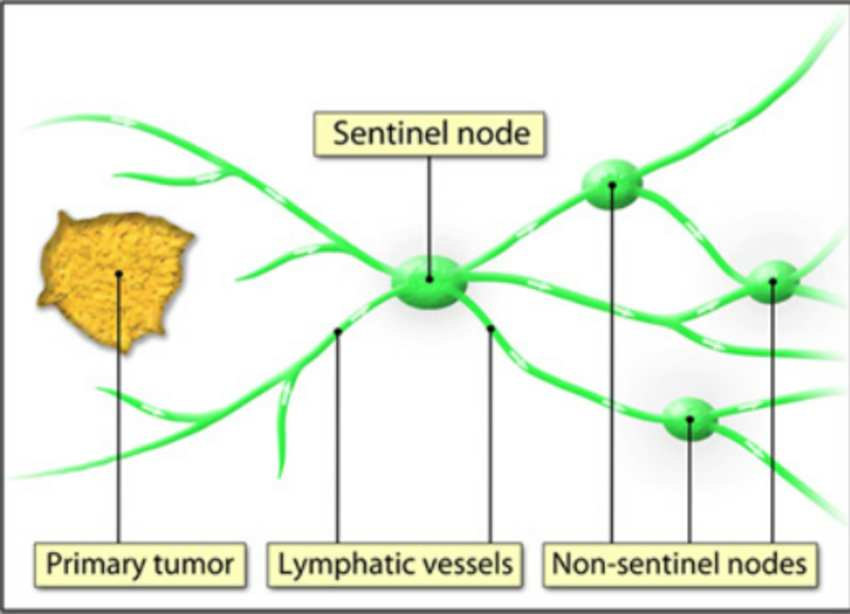
Many conducted studies are focusing on morbidity minimization due to SLN mapping.
In advanced stages of endometrial cancer, negative histopathologic evaluation of SLN can lead to lack of paraortic complete bilateral lymphadenectomy, down staging of the lesion and increase of overall survival, free disease survival and patient’s quality of life. [23] (Figure VII.)
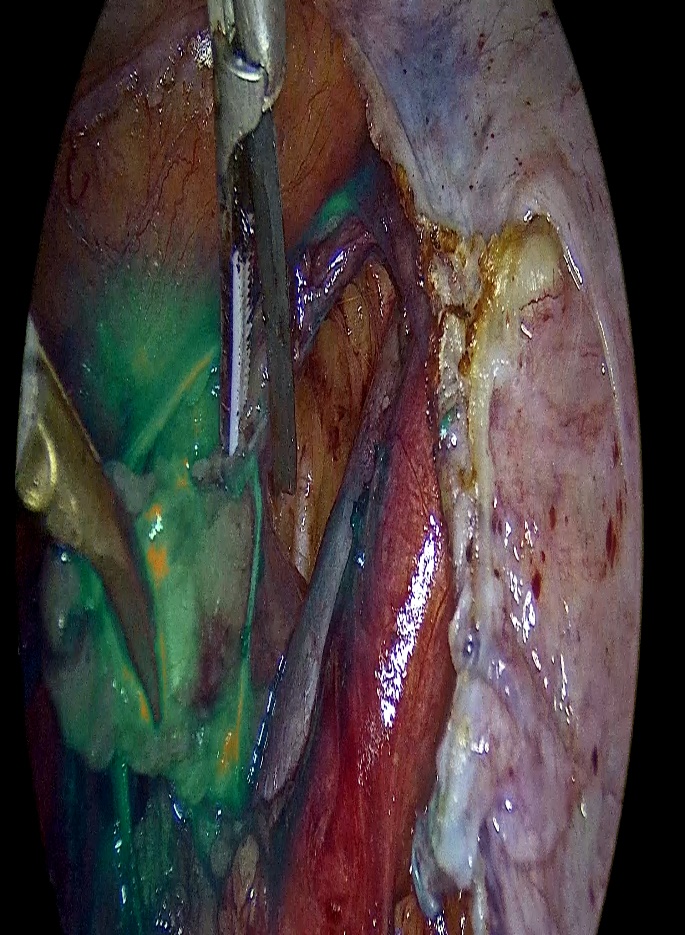
According to recent literature, many conducted studies suggest SLN mapping as alternative therapeutic strategy towards systematic pelvic and para-aortic lymph node dissection in cases with low grade endometrial cancer and second thinking for cases with high grade endometrial cancer. (Figure VIII.)
Many well organized surgical centers take advantage of increased medical equipment and manage to determine precise therapeutic alternatives towards premenopausal patients with endometrial cancer focusing on potential fertility preservation.
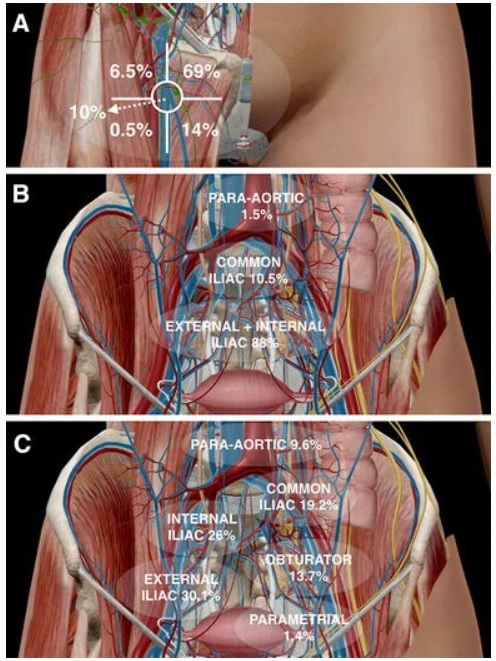
After the establishment of SLN mapping especially in cases of low risk endometrial cancer, critical question of all recent conducted studies remains what will be the crucial next step.
Focusing on histologic type in cases of endometrial cancer such as clear cell or serous endometrial cancer and staging of the lesion such as cases with grade three type, many organized centers across Europe or in the U.S. working towards a SLN protocol absolutely acceptable in order to establish more accurate and precise therapeutic strategy. [21]
Resulting in many conducted studies and algorithm proposals, surgical randomized trials with SLN mapping have been performed.
STATEC (Selective Targeting of Adjuvant Therapy in Endometrial Cancer) represents a randomized phase 3 study, which includes two independent groups. [24]
Study group depicting patients underwent total hysterectomy with pelvic and para-aortic node dissection with optional SLN mapping comparing with control group of patients underwent total hysterectomy without pelvic and para-aortic dissection in cases of extended stages of endometrial cancer. [21]
Focusing on the increased step of medical technology, molecular analysis of SLN mapping could provide promising information regarding early diagnosis of endometrial cancer cases. [21]
Aboulouard et al. suggested in depth molecular analysis of proteomics variations in SLN proteins, comparing with parallel analysis inside proteins of endometrial tumors. [25]
These protein variations depict potential markers with direct affection of overall survival.
Five major proteins for EC and SLN (PRSS3, PTX3, ASS1, ALDH2, and ANXA1) were identified in large-scale proteomics and validated by immunohistochemistry.
Study of Aboulouard et al. consists protein correlation of SLN mapping and endometrial cancer, optimal tool concerning early or advanced stages of endometrial cancer. (Figure IX.)
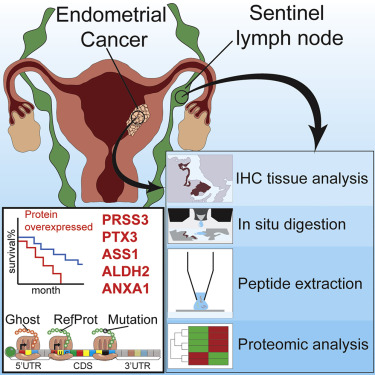
This conducted study reflects promising pathways in order to establish optimal therapeutic strategy in cases of endometrial cancer affecting especially premenopausal patients direct correlated with fertility preservation.
Author declares any financial interest with respect to this manuscript.
Endometrial cancer represents the 2nd most often gynecologic malignancy after cervix carcinoma among female population.
SLN mapping depicts first lymphatic drainage throughout lymphatic channels.
Increased sensitivity and decreased false negative rate lead to promising pathways concerning less surgical interventions and less intraoperative and postoperative potential complications.
Clearly Auctoresonline and particularly Psychology and Mental Health Care Journal is dedicated to improving health care services for individuals and populations. The editorial boards' ability to efficiently recognize and share the global importance of health literacy with a variety of stakeholders. Auctoresonline publishing platform can be used to facilitate of optimal client-based services and should be added to health care professionals' repertoire of evidence-based health care resources.

Journal of Clinical Cardiology and Cardiovascular Intervention The submission and review process was adequate. However I think that the publication total value should have been enlightened in early fases. Thank you for all.

Journal of Women Health Care and Issues By the present mail, I want to say thank to you and tour colleagues for facilitating my published article. Specially thank you for the peer review process, support from the editorial office. I appreciate positively the quality of your journal.
Journal of Clinical Research and Reports I would be very delighted to submit my testimonial regarding the reviewer board and the editorial office. The reviewer board were accurate and helpful regarding any modifications for my manuscript. And the editorial office were very helpful and supportive in contacting and monitoring with any update and offering help. It was my pleasure to contribute with your promising Journal and I am looking forward for more collaboration.

We would like to thank the Journal of Thoracic Disease and Cardiothoracic Surgery because of the services they provided us for our articles. The peer-review process was done in a very excellent time manner, and the opinions of the reviewers helped us to improve our manuscript further. The editorial office had an outstanding correspondence with us and guided us in many ways. During a hard time of the pandemic that is affecting every one of us tremendously, the editorial office helped us make everything easier for publishing scientific work. Hope for a more scientific relationship with your Journal.

The peer-review process which consisted high quality queries on the paper. I did answer six reviewers’ questions and comments before the paper was accepted. The support from the editorial office is excellent.

Journal of Neuroscience and Neurological Surgery. I had the experience of publishing a research article recently. The whole process was simple from submission to publication. The reviewers made specific and valuable recommendations and corrections that improved the quality of my publication. I strongly recommend this Journal.

Dr. Katarzyna Byczkowska My testimonial covering: "The peer review process is quick and effective. The support from the editorial office is very professional and friendly. Quality of the Clinical Cardiology and Cardiovascular Interventions is scientific and publishes ground-breaking research on cardiology that is useful for other professionals in the field.

Thank you most sincerely, with regard to the support you have given in relation to the reviewing process and the processing of my article entitled "Large Cell Neuroendocrine Carcinoma of The Prostate Gland: A Review and Update" for publication in your esteemed Journal, Journal of Cancer Research and Cellular Therapeutics". The editorial team has been very supportive.

Testimony of Journal of Clinical Otorhinolaryngology: work with your Reviews has been a educational and constructive experience. The editorial office were very helpful and supportive. It was a pleasure to contribute to your Journal.

Dr. Bernard Terkimbi Utoo, I am happy to publish my scientific work in Journal of Women Health Care and Issues (JWHCI). The manuscript submission was seamless and peer review process was top notch. I was amazed that 4 reviewers worked on the manuscript which made it a highly technical, standard and excellent quality paper. I appreciate the format and consideration for the APC as well as the speed of publication. It is my pleasure to continue with this scientific relationship with the esteem JWHCI.

This is an acknowledgment for peer reviewers, editorial board of Journal of Clinical Research and Reports. They show a lot of consideration for us as publishers for our research article “Evaluation of the different factors associated with side effects of COVID-19 vaccination on medical students, Mutah university, Al-Karak, Jordan”, in a very professional and easy way. This journal is one of outstanding medical journal.
Dear Hao Jiang, to Journal of Nutrition and Food Processing We greatly appreciate the efficient, professional and rapid processing of our paper by your team. If there is anything else we should do, please do not hesitate to let us know. On behalf of my co-authors, we would like to express our great appreciation to editor and reviewers.

As an author who has recently published in the journal "Brain and Neurological Disorders". I am delighted to provide a testimonial on the peer review process, editorial office support, and the overall quality of the journal. The peer review process at Brain and Neurological Disorders is rigorous and meticulous, ensuring that only high-quality, evidence-based research is published. The reviewers are experts in their fields, and their comments and suggestions were constructive and helped improve the quality of my manuscript. The review process was timely and efficient, with clear communication from the editorial office at each stage. The support from the editorial office was exceptional throughout the entire process. The editorial staff was responsive, professional, and always willing to help. They provided valuable guidance on formatting, structure, and ethical considerations, making the submission process seamless. Moreover, they kept me informed about the status of my manuscript and provided timely updates, which made the process less stressful. The journal Brain and Neurological Disorders is of the highest quality, with a strong focus on publishing cutting-edge research in the field of neurology. The articles published in this journal are well-researched, rigorously peer-reviewed, and written by experts in the field. The journal maintains high standards, ensuring that readers are provided with the most up-to-date and reliable information on brain and neurological disorders. In conclusion, I had a wonderful experience publishing in Brain and Neurological Disorders. The peer review process was thorough, the editorial office provided exceptional support, and the journal's quality is second to none. I would highly recommend this journal to any researcher working in the field of neurology and brain disorders.

Dear Agrippa Hilda, Journal of Neuroscience and Neurological Surgery, Editorial Coordinator, I trust this message finds you well. I want to extend my appreciation for considering my article for publication in your esteemed journal. I am pleased to provide a testimonial regarding the peer review process and the support received from your editorial office. The peer review process for my paper was carried out in a highly professional and thorough manner. The feedback and comments provided by the authors were constructive and very useful in improving the quality of the manuscript. This rigorous assessment process undoubtedly contributes to the high standards maintained by your journal.

International Journal of Clinical Case Reports and Reviews. I strongly recommend to consider submitting your work to this high-quality journal. The support and availability of the Editorial staff is outstanding and the review process was both efficient and rigorous.

Thank you very much for publishing my Research Article titled “Comparing Treatment Outcome Of Allergic Rhinitis Patients After Using Fluticasone Nasal Spray And Nasal Douching" in the Journal of Clinical Otorhinolaryngology. As Medical Professionals we are immensely benefited from study of various informative Articles and Papers published in this high quality Journal. I look forward to enriching my knowledge by regular study of the Journal and contribute my future work in the field of ENT through the Journal for use by the medical fraternity. The support from the Editorial office was excellent and very prompt. I also welcome the comments received from the readers of my Research Article.

Dear Erica Kelsey, Editorial Coordinator of Cancer Research and Cellular Therapeutics Our team is very satisfied with the processing of our paper by your journal. That was fast, efficient, rigorous, but without unnecessary complications. We appreciated the very short time between the submission of the paper and its publication on line on your site.

I am very glad to say that the peer review process is very successful and fast and support from the Editorial Office. Therefore, I would like to continue our scientific relationship for a long time. And I especially thank you for your kindly attention towards my article. Have a good day!

"We recently published an article entitled “Influence of beta-Cyclodextrins upon the Degradation of Carbofuran Derivatives under Alkaline Conditions" in the Journal of “Pesticides and Biofertilizers” to show that the cyclodextrins protect the carbamates increasing their half-life time in the presence of basic conditions This will be very helpful to understand carbofuran behaviour in the analytical, agro-environmental and food areas. We greatly appreciated the interaction with the editor and the editorial team; we were particularly well accompanied during the course of the revision process, since all various steps towards publication were short and without delay".

I would like to express my gratitude towards you process of article review and submission. I found this to be very fair and expedient. Your follow up has been excellent. I have many publications in national and international journal and your process has been one of the best so far. Keep up the great work.

We are grateful for this opportunity to provide a glowing recommendation to the Journal of Psychiatry and Psychotherapy. We found that the editorial team were very supportive, helpful, kept us abreast of timelines and over all very professional in nature. The peer review process was rigorous, efficient and constructive that really enhanced our article submission. The experience with this journal remains one of our best ever and we look forward to providing future submissions in the near future.

I am very pleased to serve as EBM of the journal, I hope many years of my experience in stem cells can help the journal from one way or another. As we know, stem cells hold great potential for regenerative medicine, which are mostly used to promote the repair response of diseased, dysfunctional or injured tissue using stem cells or their derivatives. I think Stem Cell Research and Therapeutics International is a great platform to publish and share the understanding towards the biology and translational or clinical application of stem cells.

I would like to give my testimony in the support I have got by the peer review process and to support the editorial office where they were of asset to support young author like me to be encouraged to publish their work in your respected journal and globalize and share knowledge across the globe. I really give my great gratitude to your journal and the peer review including the editorial office.

I am delighted to publish our manuscript entitled "A Perspective on Cocaine Induced Stroke - Its Mechanisms and Management" in the Journal of Neuroscience and Neurological Surgery. The peer review process, support from the editorial office, and quality of the journal are excellent. The manuscripts published are of high quality and of excellent scientific value. I recommend this journal very much to colleagues.

Dr.Tania Muñoz, My experience as researcher and author of a review article in The Journal Clinical Cardiology and Interventions has been very enriching and stimulating. The editorial team is excellent, performs its work with absolute responsibility and delivery. They are proactive, dynamic and receptive to all proposals. Supporting at all times the vast universe of authors who choose them as an option for publication. The team of review specialists, members of the editorial board, are brilliant professionals, with remarkable performance in medical research and scientific methodology. Together they form a frontline team that consolidates the JCCI as a magnificent option for the publication and review of high-level medical articles and broad collective interest. I am honored to be able to share my review article and open to receive all your comments.

“The peer review process of JPMHC is quick and effective. Authors are benefited by good and professional reviewers with huge experience in the field of psychology and mental health. The support from the editorial office is very professional. People to contact to are friendly and happy to help and assist any query authors might have. Quality of the Journal is scientific and publishes ground-breaking research on mental health that is useful for other professionals in the field”.

Dear editorial department: On behalf of our team, I hereby certify the reliability and superiority of the International Journal of Clinical Case Reports and Reviews in the peer review process, editorial support, and journal quality. Firstly, the peer review process of the International Journal of Clinical Case Reports and Reviews is rigorous, fair, transparent, fast, and of high quality. The editorial department invites experts from relevant fields as anonymous reviewers to review all submitted manuscripts. These experts have rich academic backgrounds and experience, and can accurately evaluate the academic quality, originality, and suitability of manuscripts. The editorial department is committed to ensuring the rigor of the peer review process, while also making every effort to ensure a fast review cycle to meet the needs of authors and the academic community. Secondly, the editorial team of the International Journal of Clinical Case Reports and Reviews is composed of a group of senior scholars and professionals with rich experience and professional knowledge in related fields. The editorial department is committed to assisting authors in improving their manuscripts, ensuring their academic accuracy, clarity, and completeness. Editors actively collaborate with authors, providing useful suggestions and feedback to promote the improvement and development of the manuscript. We believe that the support of the editorial department is one of the key factors in ensuring the quality of the journal. Finally, the International Journal of Clinical Case Reports and Reviews is renowned for its high- quality articles and strict academic standards. The editorial department is committed to publishing innovative and academically valuable research results to promote the development and progress of related fields. The International Journal of Clinical Case Reports and Reviews is reasonably priced and ensures excellent service and quality ratio, allowing authors to obtain high-level academic publishing opportunities in an affordable manner. I hereby solemnly declare that the International Journal of Clinical Case Reports and Reviews has a high level of credibility and superiority in terms of peer review process, editorial support, reasonable fees, and journal quality. Sincerely, Rui Tao.

Clinical Cardiology and Cardiovascular Interventions I testity the covering of the peer review process, support from the editorial office, and quality of the journal.

Clinical Cardiology and Cardiovascular Interventions, we deeply appreciate the interest shown in our work and its publication. It has been a true pleasure to collaborate with you. The peer review process, as well as the support provided by the editorial office, have been exceptional, and the quality of the journal is very high, which was a determining factor in our decision to publish with you.
The peer reviewers process is quick and effective, the supports from editorial office is excellent, the quality of journal is high. I would like to collabroate with Internatioanl journal of Clinical Case Reports and Reviews journal clinically in the future time.

Clinical Cardiology and Cardiovascular Interventions, I would like to express my sincerest gratitude for the trust placed in our team for the publication in your journal. It has been a true pleasure to collaborate with you on this project. I am pleased to inform you that both the peer review process and the attention from the editorial coordination have been excellent. Your team has worked with dedication and professionalism to ensure that your publication meets the highest standards of quality. We are confident that this collaboration will result in mutual success, and we are eager to see the fruits of this shared effort.

Dear Dr. Jessica Magne, Editorial Coordinator 0f Clinical Cardiology and Cardiovascular Interventions, I hope this message finds you well. I want to express my utmost gratitude for your excellent work and for the dedication and speed in the publication process of my article titled "Navigating Innovation: Qualitative Insights on Using Technology for Health Education in Acute Coronary Syndrome Patients." I am very satisfied with the peer review process, the support from the editorial office, and the quality of the journal. I hope we can maintain our scientific relationship in the long term.
Dear Monica Gissare, - Editorial Coordinator of Nutrition and Food Processing. ¨My testimony with you is truly professional, with a positive response regarding the follow-up of the article and its review, you took into account my qualities and the importance of the topic¨.

Dear Dr. Jessica Magne, Editorial Coordinator 0f Clinical Cardiology and Cardiovascular Interventions, The review process for the article “The Handling of Anti-aggregants and Anticoagulants in the Oncologic Heart Patient Submitted to Surgery” was extremely rigorous and detailed. From the initial submission to the final acceptance, the editorial team at the “Journal of Clinical Cardiology and Cardiovascular Interventions” demonstrated a high level of professionalism and dedication. The reviewers provided constructive and detailed feedback, which was essential for improving the quality of our work. Communication was always clear and efficient, ensuring that all our questions were promptly addressed. The quality of the “Journal of Clinical Cardiology and Cardiovascular Interventions” is undeniable. It is a peer-reviewed, open-access publication dedicated exclusively to disseminating high-quality research in the field of clinical cardiology and cardiovascular interventions. The journal's impact factor is currently under evaluation, and it is indexed in reputable databases, which further reinforces its credibility and relevance in the scientific field. I highly recommend this journal to researchers looking for a reputable platform to publish their studies.

Dear Editorial Coordinator of the Journal of Nutrition and Food Processing! "I would like to thank the Journal of Nutrition and Food Processing for including and publishing my article. The peer review process was very quick, movement and precise. The Editorial Board has done an extremely conscientious job with much help, valuable comments and advices. I find the journal very valuable from a professional point of view, thank you very much for allowing me to be part of it and I would like to participate in the future!”

Dealing with The Journal of Neurology and Neurological Surgery was very smooth and comprehensive. The office staff took time to address my needs and the response from editors and the office was prompt and fair. I certainly hope to publish with this journal again.Their professionalism is apparent and more than satisfactory. Susan Weiner

My Testimonial Covering as fellowing: Lin-Show Chin. The peer reviewers process is quick and effective, the supports from editorial office is excellent, the quality of journal is high. I would like to collabroate with Internatioanl journal of Clinical Case Reports and Reviews.

My experience publishing in Psychology and Mental Health Care was exceptional. The peer review process was rigorous and constructive, with reviewers providing valuable insights that helped enhance the quality of our work. The editorial team was highly supportive and responsive, making the submission process smooth and efficient. The journal's commitment to high standards and academic rigor makes it a respected platform for quality research. I am grateful for the opportunity to publish in such a reputable journal.
My experience publishing in International Journal of Clinical Case Reports and Reviews was exceptional. I Come forth to Provide a Testimonial Covering the Peer Review Process and the editorial office for the Professional and Impartial Evaluation of the Manuscript.
